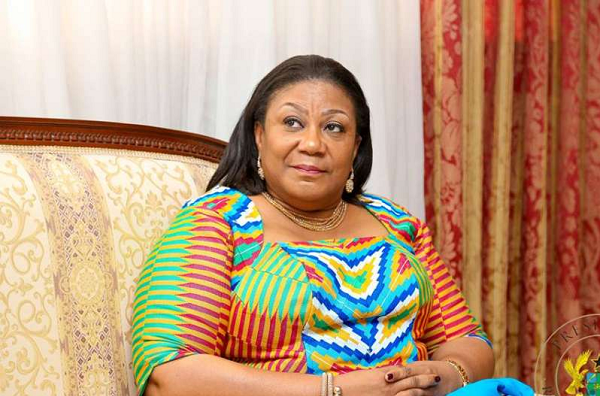
Get up, speak out, save adolescent girls from malaria
International Day of the Girl Child: Get up, speak out, save adolescent girls from malaria.
October 11 is the International Day of the Girl Child. Launched in 2012 by the United Nations, this day has been set aside to highlight the challenges girls face and empower them to fulfil their dreams.
Advertisement
As the Chairperson of the Infanta Malaria Foundation, I have been championing malaria elimination for over a decade, and since taking on the role of the First Lady, I have been working together with national and international stakeholders to empower our girls.
As a country, we are focusing on the health of our adolescent girls because they make up 20 per cent of Ghana’s female population (and 10 per cent of the total population) and are a critical foundation for our development.
Top killer
Globally, malaria is among the top killers of adolescent girls and contributes to 7.4 per cent of deaths among this population. Malaria is a serious health risk during pregnancy, especially during the first pregnancy, which for many in malaria-endemic countries occurs during adolescence.
Malaria causes anaemia, a life-threatening condition for the mother and newborn, in which the body is depleted of healthy red blood cells. Surviving newborns may be severely underweight, and this could delay physical and mental development.
Call to action
To ensure that millions of pregnant girls and women, and their newborns are protected from malaria in pregnancy, the RBM Partnership to End Malaria renewed its ‘Speed Up Scale-Up of IPTp’ Call to Action on October 6, 2020.
This campaign urges all policymakers across Africa to make it a priority that every pregnant woman and girl receives at least three doses of quality-assured antimalarial used as the intermittent preventive treatment of malaria in pregnancy (IPTp).
Our partner, Medicines for Malaria Venture, is also working to ensure that quality-assured SP is made available to all pregnant women by promoting local manufacturing in malaria-endemic countries.
Studies
This Call to Action is very timely for Ghana because in 2014, one in every three pregnant females was an adolescent. A study conducted in the Western Region also indicates that pregnant adolescents are more likely to have malaria and anaemia than their older counterparts. Another study in Accra revealed that as many as three out of every four pregnant girls were anaemic prior to their first antenatal visit.
This evidence highlights the life-saving importance of ensuring that young girls delay pregnancy until they reach a more mature age, and if they do become pregnant, they must receive early and regular antenatal care, which includes quality-assured IPTp as well as iron and folate supplements.
Recommended strategies
As a country, our recommended strategies to prevent malaria among pregnant women include the distribution of insecticide treated nets and the administration of at least three or more doses of IPTp, delivered to pregnant women at monthly intervals, starting in their second trimester of pregnancy.
Yet, these preventive strategies cannot be accessed by expectant women and girls until they begin their antenatal visits. For pregnant girls, the situation is more challenging as they may delay antenatal care until the pregnancy is well advanced or altogether abandon antenatal visits for fear of social stigma, the need for parental consent or lack of financial resources.
I have been working together with the National Malaria Control Programme (NMCP) and other relevant units through various campaigns to protect adolescent girls from malaria and its adverse impacts on pregnancy and contribution to anaemia.
To reduce the alarming rate of anaemia among young girls, I launched the Girls’ Iron and Folic Acid supplementation (GIFTS) programme in several regions of the country together with the Ghana Health Service, the Ghana Education Service, KOICA, UNICEF, USAID, United States Centres for Disease Control, the World Health Organisation and other development partners.
Ghana’s Adolescent Health Service Policy and Strategy (2016-2020) also highlights the importance of delayed pregnancy as one of its cardinal outcomes so that adolescents are free from unwanted or unplanned sex, pregnancy and childbearing. Additionally, young people are able to obtain health information and services, including adapted counselling when seeking care at various levels of health service delivery.
Evidence is the backbone of effective policymaking. Therefore, our national health data must be strengthened to identify the extent of the burden of malaria among adolescents.
Life-threatening risks
Yet beyond national leadership, it is critical that adolescent girls are empowered and educated on the life-threatening risks associated with malaria, particularly during early pregnancy.
Malaria prevention and treatment programmes can be combined with reproductive and sexual health education as well as school-feeding programmes to achieve effective sensitisation and optimal coverage.
Our local communities and health workers must equally be engaged; They must encourage girls to seek malaria treatment and preventative care if they are pregnant so that no additional young life is lost to malaria.
On this International Day of the Girl Child, it is time to get up and speak out to save the lives of our future leaders from malaria.
The writers are: Mrs Rebecca Akufo-Addo, First Lady; Dr Keziah Malm, Manager, NMCP; Dr Julie Gutman and Dr Maurice Bucagu, Malaria in Pregnancy Working Group of the UN Roll Back Malaria Partnership, and Dr Abena Poku-Awuku, Medicines for Malaria Venture



